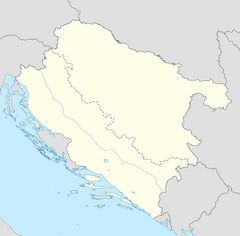Đurđevdan uprising
| May 1941 Sanski Most revolt | |||||||
|---|---|---|---|---|---|---|---|
| Part of World War II in Yugoslavia | |||||||
|
|||||||
| Belligerents | |||||||
|
Serb insurgents:
|
Axis Powers:
|
||||||
| Commanders and leaders | |||||||
|
|||||||
| Casualties and losses | |||||||
| several dozens Serb peasants killed during the uprising 27 Serb civilians executed after the suppression of the uprising |
2-6 Ustaše wounded 2–3 German soldiers wounded |
||||||
Serb insurgents:
The May 1941 Sanski Most revolt (also known as the Đurđevdan uprising (Serbian: Ђурђевдански устанак) or the rebellion of the Sana peasants (Serbian: Побуна санских сељака) occurred near the town of Sanski Most in what was at the time Axis-occupied Yugoslavia. The Serb population revolted against oppression by the Ustaše regime, the rulers of the Independent State of Croatia who were sponsored by Nazi Germany. Many civilians died during the three days of hostilities.
On 6 May 1941, during Đurđevdan slava, a Eastern Orthodox holy day in honour of Saint George, the uprising began in Kijevo and Tramošnja villages and continued for three days. It was the first episode of hostility against the occupying forces.
The celebration of Đurđevdan in Kijevo and Tramošnja was disturbed by the Ustaše. This provoked local Serb civilians to rise up against the Ustaše. To suppress the uprising, the Ustaše requested help from Germany. On 7-8 May 1941, German infantry and artillery forces arrived in the villages. They took 450 Serb civilians hostage. By 8 May 1941, the uprising was suppressed. Many Serb civilians were killed. Up to three Germans and 2 Ustaše were injured. On 9 May 1941, 27 Serb civilians were executed in retaliation. Their bodies were hanged in the center of Sanski Most. In 1973, their bodies were interred in a memorial in Sušnjar.
The Independent State of Croatia (NDH) was a World War II puppet state of Nazi Germany and Italy. It was created on 10 April 1941 from part of Democratic Federal Yugoslavia which had been occupied by the Axis powers. The Independent State of Croatia consumed most of current day Croatia and Bosnia and Herzegovina and part of Serbia.
...
Wikipedia

